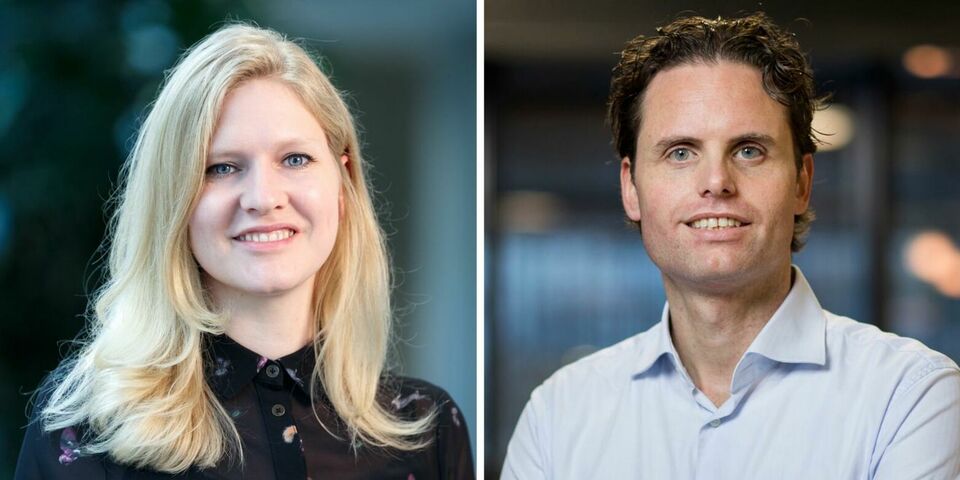Young Academy welcomes two new TU/e researchers
TU/e researchers Liesbeth Janssen and Tom de Greef are among the ten new members of the Young Academy, who were announced by the KNAW today. Janssen is assistant professor at the department of Applied Physics. De Greef is associate professor at the department of Biomedical Engineering and working at the Institute for Complex Molecular Systems.
The Young Academy exists since 2005 as an independent platform within the Royal Netherlands Academy of Arts and Sciences (KNAW) and has fifty members, ten of whom join and leave the academy annually. One of the newcomers is biomedical engineer Tom de Greef from Eindhoven, who says that his election as a member of the academy for the next five years is a “tremendous honor” and a recognition of the collaborative effort within his group.
De Greef and his group focus on synthetic biology, a new field of science that views living systems as a treasure trove of new technological innovations. Some compelling examples mentioned by De Greef include the use of synthetic DNA as a new and eco-friendly alternative for data storage, and the ability to use genetically engineered bacteria to take CO2 out of the air.
What the 39-year-old researchers mostly hopes to accomplish as a member of the Young Academy, is to start a discussion about research financing in the Netherlands, and about “how we can drastically simplify the entire system.” He points to the Dutch research field, which was once organized along clear lines, with academic researchers on one side and the government on the other. “That unequivocal and simple relationship no longer exists. The flows of funds have become too complex.”
Jungle
Most of the innovations in our society can be traced back to public funding, according to De Greef, “even the ones we wouldn’t expect - such as the search engine of Google, which was paid for by an NFS grant (of the U.S. National Science Foundation, ed.).” That is why he calls for “more money for mission driven research into emerging technologies, and less money for public-private partnerships. Put more trust in scientists and give them time to solve complex and socially relevant problems, without exposing them to a jungle of regulations and control.”
De Greef’s fellow researcher at TU/e, physicist Liesbeth Janssen, also wants to collaborate on “important issues that have an impact on all of us” with scientists from different fields within the Young Academy - but her agenda is slightly different. Diversity and inclusiveness policy features particularly high on the 35-yeard-old assistant professor’s list of priorities.
She speaks of “an important issue that is now also high on the agenda of TU/e and about which much substantial scientific knowledge is available within the Young Academy as well. I would like to contribute to some sort of ‘practical handbook’ for diversity policy that will help put into action and apply that scientific knowledge within TU/e.”
Focus on glass
Janssen finds it “difficult to say” why TU/e nominated her for the national platform. “Perhaps because of my passion for research and my outreach activities, and because of broader issues such as diversity policy.” She describes her appointment as “a great honor” and a recognition of her scientific work, which focuses on glass.
“We all use glass on a daily basis, we’ve known how to make it for thousands of years, but on balance, we know very little about it. Because when you look at glass at an atomic level, it looks like a liquid, but it behaves like a solid. And that’s really strange: the macroscopic behavior doesn’t seem to match with the material’s atomic structure at all.”
Janssen and her colleagues try to better understand and eventually solve that problem with and entirely new theory. “In doing so, we don’t just look at familiar examples of glass, but we also use that theory to develop sustainable plastics, for example, and even to explain glassy behavior of living cells in the body. The latter offers interesting opportunities to say something, purely from the perspective of physics, about processes such as wound healing and cancer metastasis.”
Partner
The Young Academy, which is meant for young researchers who received their doctorate less than ten years before their appointment to the academy, aims to stimulate interdisciplinary research and to communicate science to the general public. It also consults with and advices scientific organizations and ministries.
TU/e researchers who preceded Janssen and De Greef at the Young Academy include Carlijn Bouten (BMT), Maaike Kroon (Chemical Engineering and Chemistry) and Bettina Speckmann (Mathematics and Computer Science), all of whom are academy alumni.


Discussion